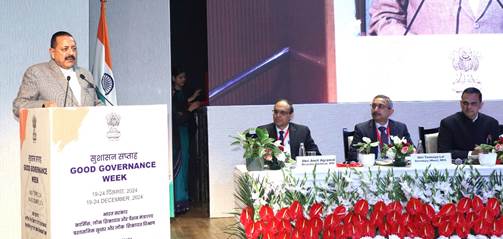Addressing at the National Workshop on Good Governance Practices, Union Minister of State (Independent Charge) for Science and Technology; Earth Sciences and Minister of State for PMO, Department of Atomic Energy, Department of Space, Personnel, Public Grievances and Pensions, Dr. Jitendra Singh highlighted the transformative initiatives that have reshaped governance under Prime Minister Narendra Modi’s leadership.
Speaking at the event inaugurating Good Governance Week, Dr. Jitendra Singh praised the “whole-of-government” approach as a key driver of these reforms. The week, running from December 19 to 25, coincides with the 100th birth anniversary of former Prime Minister Atal Bihari Vajpayee, who is celebrated for his legacy in governance.

Dr. Jitendra Singh commended the collaborative efforts across government departments and ministries, which have advanced both administrative efficiency and social welfare. “The whole-of-government approach has harmonized efforts to implement governance reforms that are efficient, inclusive, and impactful,” he remarked. A significant aspect of his address focused on innovations in waste management and the prioritization of cleanliness, which have evolved into models of economic and environmental sustainability.
The Union Minister lauded the Swachhata Campaign, calling it a landmark initiative that has reshaped governance. Over ₹2,364 crores were generated in just four years through the systemic clearance and monetization of scrap and obsolete materials from government offices. “Governance practices have evolved from reducing file journey time and promoting digitalization to creating wealth from waste,” Dr. Jitendra Singh noted.

The Minister further highlighted the financial success of this initiative by comparing it to the cost of Chandrayaan, India’s lunar mission. “While Chandrayaan cost ₹600 crore, we earned four times that by monetizing waste—resources that had been dormant for decades,” he explained. The initiative has also cleared over 643 lakh square feet of office space, creating opportunities for repurposing these areas.
Dr. Jitendra Singh recalled the Prime Minister’s call for building toilets during his 2014 Independence Day speech, a pivotal moment that led to the construction of over 4 lakh women’s toilets, addressing a critical societal need. This grassroots initiative demonstrated how governance could drive transformational change.
In discussing pioneering waste management steps, the Minister pointed to initiatives like converting household waste into fuel and recycling used cooking oil into biofuel. A pilot project was undertaken in Dehradun, which curtailed harmful reuse practices and promoted recycling. “Every bit of waste is wealth,” he emphasized, highlighting India’s leadership in the global movement towards a circular economy.

Dr. Jitendra Singh also spoke about mobile waste conversion vans, which are equipped to turn waste into usable resources on-site, reducing reliance on centralized facilities. “These technologies make waste management more accessible and efficient,” he stated.
Positioning waste management and sustainability as central to India’s economic ambitions, the Minister declared, “The next industrial revolution will be driven by recycling.” He pointed to innovations in biotechnology and material sciences at government and private research institutes that are transforming waste into fuel, fertilizers, and industrial raw materials.
Dr. Jitendra Singh stressed the importance of extending good governance practices to the grassroots level, engaging districts, panchayats, and local communities. Drawing inspiration from the success of the Swachh Bharat Mission, he urged greater civil society involvement. “When governance aligns with people’s participation, it becomes a mass movement,” he observed.
Looking ahead, the Minister announced plans to integrate public and private sector efforts more thoroughly in future campaigns, suggesting that public sector practices could benefit from the efficiency and waste-eliminating practices of the private sector.
During the event, Dr. Jitendra Singh released the assessment report of Special Campaign 4.0, which showcased significant milestones in advancing cleanliness and efficiency across government offices. The report highlighted the clearance of thousands of pending files, monetization of scrap materials, and optimization of office spaces. Additionally, the Minister inaugurated an exhibition featuring “waste to wealth” products created by various government departments, underscoring the government’s commitment to sustainability and resource efficiency.
Concluding his address, Dr. Jitendra Singh reiterated the government’s commitment to fostering innovative, inclusive, and sustainable governance. “Good governance is not just about policies and reforms; it’s about creating a system where nothing goes to waste. We are building a New India where governance transforms challenges into opportunities,” he stated.
As Good Governance Week continues, the Minister called for ongoing collaboration and innovation, with the lessons learned from this event set to inspire future campaigns. “The integration of administrative reforms, technological solutions, and societal participation is the cornerstone of New India’s governance model,” he concluded.
The event was attended by distinguished dignitaries, including Shri V. Srinivas, Secretary, DARPG; Smt. Vandita Kaul, Secretary, Posts; Shri R. Rajagopal, DG(HR), Railway Board; and Shri Arun Singhal, DG, National Archives of India.





